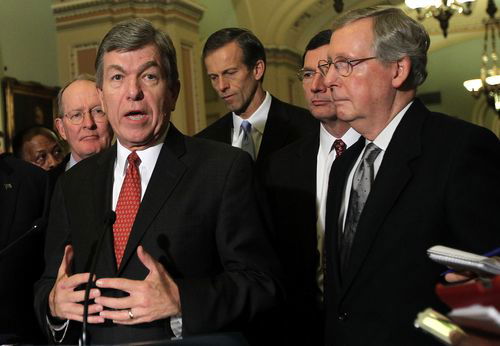Senate Republicans to keep earmark ban, though GOP conference rules offer some wiggle room

Senate Republicans on Wednesday declined to change their conference rules that ban their use of earmarks, an issue that divides the GOP conference and will be a test for how the party will operate over the next several months with Democrats in control of the US Senate.
Not a single senator offered an amendment to allow earmarks again during a closed door meeting Wednesday afternoon, so the old rules banning them continues, according to Republican Sens. Ted Cruz of Texas and Richard Shelby of Alabama.
However, because those conference rules are nonbinding, a Republican senator may still choose to request earmarks. Several GOP senators had said before Wednesday’s meeting that they still planned to ask for them no matter what the conference decided.
Earmarks allow members to specifically target where they want certain funding to go. Without them, those decisions are made by government officials at the agencies.
Senate Democrats will allow them, and House Republicans voted last month to allow conference members to ask for them.
Not holding a formal vote in conference allowed Republican senators to avoid a contentious intra-party discussion on the issue. The conference has been divided over whether it should bring earmarks back, and there were still signs of division following the conference meeting.
Sen. Susan Collins, a Republican from Maine, said she does still plan to request earmarks during the appropriations process, but that she needs to seek more clarity from leadership on what the action of the conference means.
The discussion to bring earmarks back comes as Democrats have already decided they will engage in the practice. Earmarks were banned in 2010 at the height of the tea party movement when controversies like the famous “bridge to nowhere” in Alaska cast doubt about whether earmarks were ethical or perpetuated wasteful spending.
A handful of Republican senators had said they plan to pursue earmarks regardless of how their conference voted. Both Shelby, the top Republican on the Appropriations Committee, and Sen. Roy Blunt, a Republican from Missouri, have said it would be a major disadvantage for Republicans to sit out of the earmarks process.
“I would expect that if House Republicans and House Democrats are going to earmark and Senate Democrats are going to earmark that I’ll be part of the process,” Blunt said ahead of Wednesday’s conference meeting.
Sen. John Thune, a South Dakota Republican who’s the minority whip, said ahead of the meeting that even if the ban stayed in place, many members would still likely request earmarks in the GOP.
“I’m fine with keeping the ban in place but, again, like I mentioned yesterday, you have all these now, the House Republicans have done it, the Democrats doing it,” Thune said. “A lot of our members don’t want to get boxed out. If the money goes back in the pool, the Democrats get to decide where it goes. There are going to be good arguments on both sides. And as I was saying, we don’t have a proposal yet to change it. So if there is not proposal to vote on, it probably stays in place.”
In March, the House Republican conference voted by secret ballot to allow earmarks to be used again within their conference. Democrats have said that in the appropriations process, the amount of money each party would get to be earmarked would be equally divided between both parties. Republicans in favor of earmarks have argued that voting against bringing them back would put their party and their states at a direct disadvantage as all the money would be earmarked for Democratic districts and states.
“If you don’t want earmarks, don’t ask for them,” Shelby said about the need to bring them back despite some GOP opposition.
In a letter Monday, 15 senators — including a member of GOP leadership, Sen. John Cornyn — wrote a letter opposed to the practice, arguing they would not participate at all even if the conference brought it back.
“Hopefully, some of us will stick with the rule that is in place,” Sen. Mike Braun, a Republican opposed to earmarks, told reporters.
Cruz, a leading Republican who fought against bringing back earmarks, said that after a “vigorous conversation” over the last several weeks, he believes more Republicans came to see his viewpoint that “earmarks are the gateway drug to excess spending.”
Cruz said he thinks that the reason no one sought to formally change the rules Wednesday through an amendment was “it was very clear the votes weren’t there.”
“Can a member choose to act differently, sure,” Cruz said. “Any individual member has to make a choice … but the conference rules are unequivocal.”
This story and headline have been updated to add additional developments.